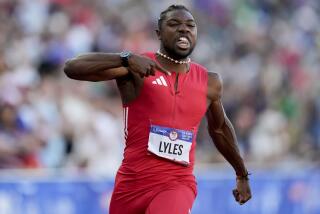Carl and Jesse: So Alike, So Different
- Share via
In 1936, Jesse Owens, American, won four Olympic gold medals in the 100- and 200-meter dashes, the broad jump and the 400-meter relay. He tied or broke the Olympic record in each of those events.
In 1984, Carl Lewis, American, won four Olympic gold medals in the 100, 200, long jump and 400 relay. He tied or broke the Olympic record in two of them.
In 1936, Jesse Owens, American, came home to a $30-a-week job as a playground director. He took to racing against horses to make a living.
He tried leading a dance band. He lost $25,000 on a touring baseball team and he finally went flat broke and had to turn back a 15-room house when his partners in a dry-cleaning venture only took Jesse to the cleaners so that it took him 59 months and three other jobs to pay off.
In 1986, Carl Lewis is a business entrepreneur with his own corporation, a fleet of cars, secretary and business manager. He doesn’t have to race horses. He gets up to $20,000 an appearance, he cuts records, has multimillion dollar shoe contracts and collects fine Waterford crystal.
In 1936, Jesse Owens boarded the boat for the Berlin Olympics with $7.40 in the pocket of his pinstriped suit that was 4 years old and two sizes too small. After the exhausting Olympics, Jesse Owens, 15 pounds underweight--the suit was now too big for him--circles under his eyes, and a nagging cough, balked at going to a scheduled meet in Stockholm so that he could go home and start cashing in on his notoriety--and the AAU banned him for life.
In 1984, Carl Lewis arrived at the Los Angeles Olympics by jet and limo, took one look at the dormitory quarters provided by the Olympic Committee--and went out and rented a house in Hollywood. When the committee protested, he just smiled. Did they want him in a dorm--or on a victory stand?
In 1936, in Berlin, Jesse Owens had wandered over to the broad jump pit and, still in sweats, pranced down the runway to test the surface. A red flag shot up, signifying it as an official jump.
Then he made a real jump, and the red flag shot up again. Foul!
He was down to one qualifying jump, which he made by taking off six inches behind the mark.
In the competition, he made the first 26-foot jump in Olympic history. It wasn’t good enough for Jesse. He took another jump, 26 feet 5 3/8 inches, setting a record that lasted for 24 years.
In 1984, Carl Lewis soared 28 feet inch on his first long jump. It equaled the second-best Olympic jump ever, by Lutz Dombrowski in 1980, but when Lewis jumped only once more and then passed on his last four allowed jumps, the crowd booed. They wanted to see Lewis attack Bob Beamon’s Olympic record of 29-2 1/2. Carl passed.
Carl Lewis is another Jesse Owens?
It’s almost as if they came from two different planets. It’s for sure they came from two different Americas.
Jesse grew up the son of a sharecropper. Carl grew up in a suburb of “curving driveways, green lawns, and Cape Cod-style homes ringed with apple orchards,” it says in “Carl! The Story of an American Hero,” by John Devaney.
Jesse grew up in white-only, lynch-law America. Carl grew up in an America where white alumni were pleading with him to honor their colleges with his athletics.
Jesse came home to a bread-line and soup-kitchen America. Carl’s America hungered only for sports.
There was no Hitler in the stands when Carl won his gold medals. There was no Jim Crow in the land when he cashed in on them. Carl Lewis could play for the Yankees if he could hit the curveball.
In 1936, Jesse Owens could not have. The Washington Redskins today would probably love to have Carl Lewis in their camp. The Washington Redskins of Jesse Owens’ day were not interested.
But one thing remains constant: The pressure of being better than the rest of the world in four different events on a track may be, if anything, more difficult in the 1980s than it was in the 1930s. Superb black athletes in Owens’ day were still such a novelty that Hitler kept referring to them as America’s “black auxiliaries” as if they were some kind of reserve division of colonial troops.
In a way, it’s Carl Lewis’ misfortune that he didn’t have a Hitler in the seats and the big bad Nazis to conquer. He didn’t even have the dreaded Commies.
It’s not that Jesse Owens had an easy run to his laurel. Ralph Metcalfe and Mack Robinson were world class in any time. But it was precisely because Carl Lewis came up in an enlightened, changed America that he had more and finer-tuned competition to hook up with, and that he had to do things like pass up four jumps and cracks at a probably unattainable world record.
But it is also precisely why Carl Lewis is not through with gold medals and world records, yet.
Jesse Owens would probably not have been able to hold his form to the 1940 Olympics even if there had been one. The obligation to make a buck, and put food on the family table in Depression America would have eroded the small muscles, anyway.
Carl doesn’t have to race horses, lead dance bands, declare bankruptcy. All he has to do is run. And jump. He hopes to retain his form through 1988 and the Seoul Olympics, where he will have a chance once and for all to outdistance his illustrious predecessor.
To that end, next Sunday in the Mt. SAC meet at Walnut, Carl will kick off his drive to Seoul and maybe his attack on Bob Beamon’s record. He says he’ll compete in a rare double, the long jump and the 100 meters.
No one has ever won the sprints in consecutive Olympics. No one has ever won four gold medals in consecutive Olympics. Is it even possible?
Says Carl Lewis: “I am perceived as arrogant and aloof when I’m often merely dedicated. Concentration is not arrogance. But, yes, I intend to be at Seoul, in shape and ready to win.”
If he is and does, he can finally lay to rest “the new Jesse Owens” tag. Jesse will become “the first Carl Lewis.”
More to Read
Go beyond the scoreboard
Get the latest on L.A.'s teams in the daily Sports Report newsletter.
You may occasionally receive promotional content from the Los Angeles Times.






